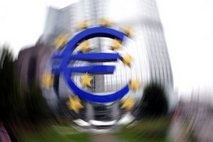Under pressure, eurozone rushes to end Greek debt discord
 With nervous markets putting pressure on the eurozone to bring the crisis to a swift end, senior finance ministry officials were scheduled to hold talks Monday and Wednesday to wrap up a deal in time for the summit.
With nervous markets putting pressure on the eurozone to bring the crisis to a swift end, senior finance ministry officials were scheduled to hold talks Monday and Wednesday to wrap up a deal in time for the summit.
The euro and global stock markets fell while the borrowing costs of Italy and Spain, two eurozone nations in the line of fire, soared to euro-era record levels amid debt contagion fears.
With fears growing that the crisis could reverberate across the world, US Treasury Secretary Timothy Geithner urged European leaders to "work more forcefully to contain the risk of an escalating crisis in Europe.
"They have the capacity to manage this in a way that doesn't add to the broader burdens in the global economy and of course we want them to do that," he told the US financial network CNBC.
German Chancellor Angela Merkel has made clear she wants a deal on the table by Thursday after she forced EU president Herman Van Rompuy to cancel plans for a meeting last Friday following a turbulent week in the markets.
She stressed on Sunday that the summit was "urgently necessary" but added: "I am only going if there's an outcome."
Her spokesman took a more optimistic tone on Monday.
"The government is working on all levels with all its strength on preparing for Thursday a good result, a decent result, a result that sends out a strong and clear signal to the markets," spokesman Steffen Seibert said.
"Confident that this will be possible, the chancellor is planning her trip to Brussels," he said.
Germany's insistence on making the private sector share the pain in a new bailout, even if its means causing a Greek debt default, has put Berlin in deep disagreement with the European Central Bank and other eurozone nations.
An EU official said that Germany had yet to hammer out differences with the ECB and other eurozone states but that Van Rompuy would never have called a summit of the 17 eurozone leaders if a deal were impossible.
"Van Rompuy would not have called a summit if he had not received enough signals from the big countries, and Germany in particular, that there was enough on the table to negotiate" an agreement, the official said.
A glimmer of compromise was raised late Monday when French European Affairs Minister Jean Leonetti said the eurozone was considering a tax on banks as one option to help Greece which would also get around the default risk.
"It is one of the solutions being talked about and would have the advantage of not involving the private banks directly (in a second Greek bailout) and so avoid the problem of a potential default," Leonetti said.
It is a proposition "worth studying," he added.
ECB president Jean-Claude Trichet reiterated that the central bank, which owns billions of euros in Greek debt it bought to keep Athens afloat, was opposed to any form of default.
"The governments have been warned," Trichet told the Financial Times Deutschland on Monday, that "if a country defaults, we will no longer be able to accept its defaulted government bonds as normal eligible collateral."
There are concerns that any new Greek rescue, either through a debt rollover, swapping Greek bonds for new ones or a bond buy-back, could be seen by rating agencies as a default.
The EU and International Monetary Fund bailed out Greece in May 2010 with a package worth 110 billion euros ($160 billion) in exchange for a series of unpopular austerity measures to stabilise its public finances.
The country is still in serious difficulty and needs another bailout valued at around the same amount. Its debt has exploded and market hostility has kept it from raising fresh loans.
What the stars mean:
★ Poor ★ ★ Promising ★★★ Good ★★★★ Very good ★★★★★ Exceptional
Latest News
More News
- Russian President congratulates Vietnamese Party leader during phone talks (January 25, 2026 | 09:58)
- Worldwide congratulations underscore confidence in Vietnam’s 14th Party Congress (January 23, 2026 | 09:02)
- Political parties, organisations, int’l friends send congratulations to 14th National Party Congress (January 22, 2026 | 09:33)
- 14th National Party Congress: Japanese media highlight Vietnam’s growth targets (January 21, 2026 | 09:46)
- 14th National Party Congress: Driving force for Vietnam to continue renewal, innovation, breakthroughs (January 21, 2026 | 09:42)
- Vietnam remains spiritual support for progressive forces: Colombian party leader (January 21, 2026 | 08:00)
- Int'l media provides large coverage of 14th National Party Congress's first working day (January 20, 2026 | 09:09)
- Vietnamese firms win top honours at ASEAN Digital Awards (January 16, 2026 | 16:45)
- ASEAN Digital Ministers' Meeting opens in Hanoi (January 15, 2026 | 15:33)
- ASEAN economies move up the global chip value chain (December 09, 2025 | 13:32)
















 Mobile Version
Mobile Version